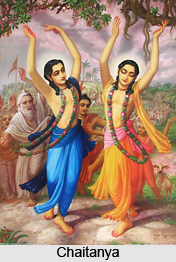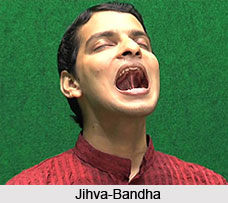 Bhakti means a school of thoughts that creates an emotional bond between the devotee and his personal god. It is a Sanskrit word which means devotion. Bhakti as a process of Yoga is described in detail within the Bhagavad Gita wherein it is given as the ultimate form of religious expression for which all other dharmas should be abandoned. It is the expression of love and adoration centered upon the supreme person rather than the supreme abstraction.
Bhakti means a school of thoughts that creates an emotional bond between the devotee and his personal god. It is a Sanskrit word which means devotion. Bhakti as a process of Yoga is described in detail within the Bhagavad Gita wherein it is given as the ultimate form of religious expression for which all other dharmas should be abandoned. It is the expression of love and adoration centered upon the supreme person rather than the supreme abstraction.
Bhakti is conceived as a personal devotion to God, a savior worthy of trust and ready to shower his blessings which is an important element of Vaishnavism and Shaivism.
There are six popular traditions which embrace Bhakti as a process of worship to a particular deity.
One of the major themes of Bhakti is that of avatar, God manifesting himself on earth in some form in order to benefit humankind in time of troubles. Lord Krishna is often cited as the supreme example of an avatar. Within Vaishnavism Bhakti is only used in conjunction with Lord Vishnu or one of his associated incarnations. Similarly in Shaivism devotion is shown to Lord Shiva.
Bhakti has two branches; they are Shaivism, Vaishnavism and Shaktism. Lord Shiva is considered the supreme in Shaivism. His origins are partly Vedic. Lord Shiva emphasizes the generative aspect of God, whom is adored in the form of the linga. Another form of Bhakti was symbolized in the rise of Vaishnavism with Lord Vishnu being its main deity. In this period Vishnu worship was further supplemented by Krishna worship. Vaishnavism of Krishna-worship has split up into many sects. Worship in public temples became common in the Gupta period. Shaktas worship a variety of goddesses
Bhakti influence in India spread to other religions coloring different aspects of Hindu culture to this day, from religious to secular, and became an integral part of Indian society.
Bhakti is devotion and practice above ritual. It is represented in terms of human relationships, most often as beloved-lover, friend-friend and parent-child. Bhakti sharply differs with some Hindu basic beliefs especially that of Karma .The Bhakti belief of Karma differ with the ordinary karmic conception of working off, eliminating good or evil Karma that the individual has developed or earned in previous lives. In the Bhakti concept Karma is set aside, the devotee expects that the lord will return love for love.



